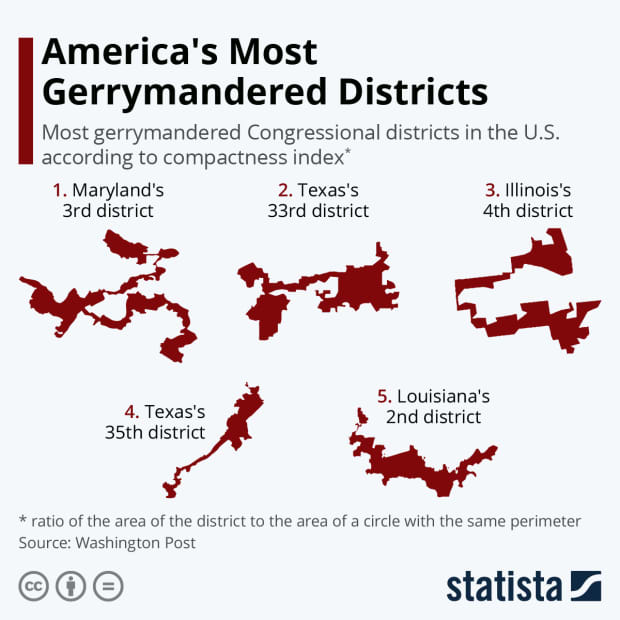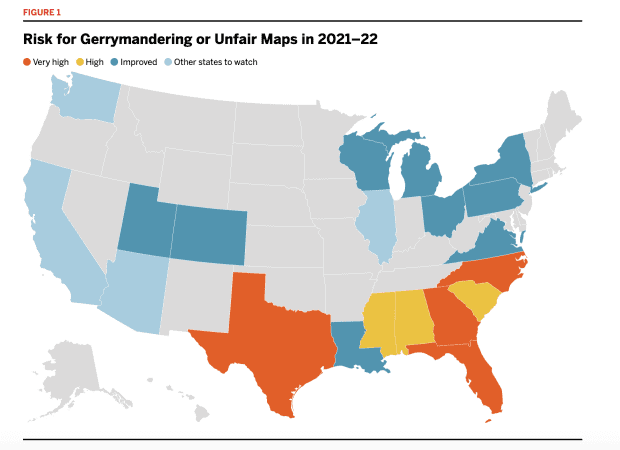# Opinion: Political gerrymandering is bad news for the economy

Table of Contents
“#
Opinion: Political gerrymandering is bad news for the economy
”
Watch the coming redrawing of congressional districts
Joe Biden won the election by seven million votes, a margin of 4.5 percentage points over Donald Trump. That you know. Now consider this: of the 155.5 million votes cast, if only 0.276% of those votes (42,918 to be exact) changed hands in Georgia, Arizona and Wisconsin, Trump would still be president. That’s how close it was.
Republicans, who were already a minority in the House, lost the Senate and the White House. And yet they control something too: the power, in most states, to redraw congressional districts based on the 2020 census.
First, the background. In most states, the state legislature controls the defining of congressional districts, and, as has been the case for several years, Republicans have the upper hand. According to the Washington-based National Conference of State Legislatures, Republicans control three-fifths of state legislatures. That means they get to draw the lines of most congressional districts that will endure until the next census in 2030.
Here’s a more detailed breakdown on who controls what in each state. And to show you how ridiculously crazy a congressional district can look after it has been carved up for partisan purposes, well, here are six examples:

Why should you care? Two reasons.
First, because the power to rewrite congressional districts gives lawmakers in many states the opportunity to “gerrymander” — that is, carve up new voting districts to serve the best interests of their party, often at the expense of citizens in those new districts. “Invariably,” notes analyst Michael Li of the Brennan Center for Justice (part of the New York University Law School), “communities of color would bear much of the brunt, facing outright discrimination in some places and being used as a convenient tool for achieving unfair partisan advantage in others.”

Brennan Center for Justice
Li’s analysis notes that southern states like Texas, Florida, Georgia and North Carolina run a “very high” risk for hyperpartisan gerrymandering as maps are redrawn. These states have single-party political control of the redistricting process. Based on preliminary Census data, Texas is expected to gain three seats in Congress, Florida two and North Carolina one.
State lawmakers could theoretically cram minority residents into fewer districts, meaning their views will be represented by fewer legislators. Or they can spread them out among several districts, thus diluting their voice. And thanks to the Supreme Court’s 2013 gutting of a key section of the Voting Rights Act of 1965, federal oversight of such changes—meant to prevent discrimination—there is less that can be done to prevent it.
So when these lines are redrawn, it ups the likelihood of politicians getting elected who look after the best interests of their gerrymandered district, but no one else.
At this point, it’s worth noting that more Americans, according to a Gallup survey consider themselves politically “independent” (50%), rather than Democrats (25%) or Republicans (25%). But it’s these two smaller groups that tend to be more energized and passionate about their hard-core views, and thus more likely to vote in all-important primaries, which in some cases are the real determinant of who’ll win a general election in November. Turnout often isn’t as intense from that vast swath of voters in the middle. This helps explain why we’re often stuck with extremist candidates from one end of the political spectrum or the other.
“That’s one consequence of gerrymandering,” Li tells me. “The only people who matter are the people who vote in primaries, so politicians cater to them.”
And why is all this potentially bad for the economy?
“Because political parties have become more extremist, and so you wind up—in the state legislature or Congress—that is populated heavily by more extremist individuals rather than centrists,” says Joel Naroff, president of Naroff Economics, LLC, a Pennsylvania-based consulting firm. “As a result, you don’t get reasonable, balanced, well-thought out policies that are directed toward a more broader-based group and benefit the most people.”
This impacts the way all sorts or economic issues are handled, be it spending, taxes, and so forth. A good example of this at the state level can be found in North Carolina, where—and despite what a majority of citizens have said they want—the legislature, because of gerrymandering, has been able to resist efforts to raise teacher pay and expand programs like pre-kindergarten and Medicaid.
Naroff says at the federal level, one example of this may be the Trump tax cuts of 2017, passed when Republicans controlled both the House and Senate. Even though corporate profits and the stock market were soaring, tax benefits were heavily skewed toward corporations, and in terms of individual tax cuts, about 80% of it went to the top 1%, while the lowest three quintiles of taxpayers (60% in total) got, on average, about $420, $230 and $50, respectively.
Read: Howard Gold says it’s official: The Trump tax cuts were a bust
Any objections to such a lopsided plan weren’t sufficiently heard in Congress, because lower-earning constituents were largely shoehorned into as few districts as possible, thus represented, again, by fewer lawmakers.
Gerrymandering can be both discriminatory and bad economics.
Also read: Georgia House passes Republican bill rolling back voting access
By
Paul Brandus
If you liked the article, do not forget to share it with your friends. Follow us on Google News too, click on the star and choose us from your favorites.
For forums sites go to Forum.BuradaBiliyorum.Com
If you want to read more News articles, you can visit our News category.




